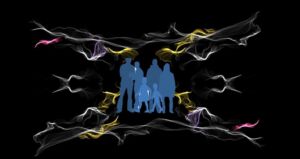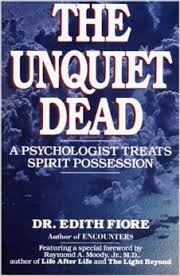by Edith Fiore, Ph.D.
 Since before recorded time men have been healed of their complaints by having spirits removed from them by priests, shamans, healers, and through concerted prayer. Throughout history and across all cultural levels the belief in spirit possession as a cause of illness, physical and mental, as well as misfortune, has persisted. Now at the end of the twentieth century, respected therapists are openly using and examining techniques that purport to remove the spirits of the dead from living people. Because of these healers’ successes, they are being taken seriously by greater numbers of their peers, and therapists are learning and using these techniques in ever-increasing numbers.
Since before recorded time men have been healed of their complaints by having spirits removed from them by priests, shamans, healers, and through concerted prayer. Throughout history and across all cultural levels the belief in spirit possession as a cause of illness, physical and mental, as well as misfortune, has persisted. Now at the end of the twentieth century, respected therapists are openly using and examining techniques that purport to remove the spirits of the dead from living people. Because of these healers’ successes, they are being taken seriously by greater numbers of their peers, and therapists are learning and using these techniques in ever-increasing numbers.
In my clinical practice I have found that almost every patient is possessed by one or more earthbound spirits, who may or may not be the cause of the patient’s presenting problems and other symptoms. If these entities are not causing the major problems, I have found that they are still having a deleterious effect, and that the situation must be addressed and corrected.
The purpose of this paper is to examine the role of possessing spirits in interpersonal relationships, to describe the processes by which the resultant problems and symptoms are eliminated, and to explain the findings. A case study will be included.
Theoretical Considerations
I have worked with depossession as an innovative psycho-spiritual therapeutic technique for over ten years with approximately a thousand patients. I use the working hypothesis that spirits do exist and that they are possessing most of my troubled patients. I have come to intellectually accept that these entities are actually people whose bodies have died and now have penetrated the spiritual boundaries of the patient—that they inhabit the body of the person. In order to accomplish this, they must enter the aura (the invisible electromagnetic force field) that normally protects the individual from such intrusions. The aura must be weakened to permit this. Drug use—even one instance—including alcohol; anesthesia and illness; extreme emotions, such as rage, jealousy, grief, etc.; and willingness for possession, either conscious or unconscious, all lower the vibrations of the aura, allowing such intrusion.
Earthbound spirits are those who have resisted the natural progress that occurs after the death of the body when one may enter the Light and the afterworld. They resist this movement to the Light for a variety of reasons: ignorance of their condition (they still assume their bodies are alive); confusion; fear, especially of hell; addictions; a desire to be with the person they possess such as a husband with his wife, a mother with her child, etc.; or motivations of revenge or of wishing to complete unfinished business. Often both the possessed and the possessor are unaware of the possession; however, frequently the possessor is aware of it while the possessed is not.
The possessing entities bring with them all of their personalities—their problems (physical, mental, and emotional), their addictions, desires, fears, etc. They come as whole beings, albeit discarnate (not in their physical bodies). Consequently, immediately upon possession, the possessed experiences changes, some subtle, others more noticeable. Earthbound spirits think and act exactly as they did moments before the death of their body. If they were suicidal, they continue to want to kill themselves; if they were in physical pain, the pain persists; if they were sick or old, they continue as they were prior to death. Possession is usually negative, although rarely there may be some minor positive aspects, such as skills or aptitudes. However, possession has a depleting effect. It can result in a full range of symptoms and problems, and can even lead to death through suicide, illness, etc.
 If we consider that the possessing entity is exactly as he/she was prior to physical death, then it becomes clear that there is almost always a problem in the interpersonal area. The living principals are usually unaware—at a conscious level—of the presence of the third (and fourth, fifth, etc.) person. However, I believe that they are always aware of the possessors at a subconscious level. I believe that, at a deep level, the possessed are able to see the auras of others, to see clairvoyantly; to know all there is to know about each other. These perceptions rarely reach the conscious level of awareness; however, they continue to exert their influence.
If we consider that the possessing entity is exactly as he/she was prior to physical death, then it becomes clear that there is almost always a problem in the interpersonal area. The living principals are usually unaware—at a conscious level—of the presence of the third (and fourth, fifth, etc.) person. However, I believe that they are always aware of the possessors at a subconscious level. I believe that, at a deep level, the possessed are able to see the auras of others, to see clairvoyantly; to know all there is to know about each other. These perceptions rarely reach the conscious level of awareness; however, they continue to exert their influence.
Since after a depossession process patients have been freed in a lasting way of problems and symptoms with which they have struggled for years, I have come to accept that there had indeed been earthbound spirits with them, and that those spirits have left. I have discussed this whole topic in my book, The Unquiet Dead.[1]
An intriguing consideration is whether all possession is karmic. When it has been necessary to explore it, I have found that not only have the possessed been the possessors in former lives, but, in some cases, they have possessed the very entities who are now possessing them. I believe that a therapist cannot alter karma, so if the depossession is successful, this success would suggest that the karmic debt has been paid. Perhaps the therapist also needed for his/her karmic reasons, to help those particular souls (the patient and the possessing entities).
Techniques
My depossession technique is simple and direct and takes, in its generalized form, about five minutes. It is presented verbatim in The Unquiet Dead. I hypnotize the patient (although this is not at all essential) and then address the possessing entities, call their attention to the nearby presence of loved ones who have passed over ahead of them, and persuade the possessors to go into the Light and to move to their new, wonderful life. Then I bring the patient out of hypnosis.
Below is a summary of the general points that are made:
- You are not…(give possessed’s name).
- Your body is dead.
- You joined…(give possessed’s name).
- You are harming yourself and…(possessed’s name).
- Your loved ones are here.
- You will be in a perfect body.
- There is no such thing as hell.
- You will have a wonderful, peaceful life.
- Go in peace with my blessings.
I call upon spiritual teachers, healers, rescue workers, in addition to the loved ones. The only way to get earthbound spirits to leave is to persuade them to go. I use any approach I can think of, if the generalized depossession does not work.
In some difficult cases, it is necessary to regress the patient to the moment that the possession occurred. This process can often provide further useful information regarding the possessor. For example, if it occurred in a certain hospital in a particular year, I use the information to advise the spirit of the circumstance of his/her own death. I might say, “Remember when you were in the San Francisco General Hospital in 1985? Your body died there, perhaps during surgery or as a result of an accident or illness. Or perhaps it died somewhere else and was brought to the hospital and you remained with it…That’s when you joined Jim.” In most cases of possession, entities are not aware that their bodies are dead.
Once the possessors are ready to go, I ask them to make up for the harm they have done by helping any other possessing entities to move toward their spirit loved ones. I suggest that they use force, if necessary, in taking possessors firmly by the hand and, despite their protests, handing them over to their loved ones and the other helpers.
In other difficult depossessions I may have to resort to doing regressions on either the possessing entities or on the patients, to allow them to remember deaths in which they went directly into the Light. These beautiful experiences are felt not only by the regressees but by any possessing entities. Usually this is all it takes to convince them that they no longer want to stay.
Case Study
Henry, a 31-year old successful entrepreneur, sought my help after reading The Unquiet Dead. At this time he felt a strong “voice” telling him: “You’re not going to find me.” A chill flowed through his body, and he wondered if his Jekyll-Hyde personality could be the result of a possession. During our first session he explained that he felt that for some time he had been two people. One person was compassionate and caring; the other was violent and out of control. This presented a real problem for his family, as he had become verbally abusive with his wife in front of his children, with the result that they were all afraid of him. His wife had told him that their marriage of seven years was on the edge and that she felt it would not survive another year.
Henry had five hospitalizations for surgeries through the years and had briefly experimented with cocaine one and a half years earlier. He realized that he had developed a problem with alcohol and that his abusiveness was heightened when he was drinking. I pointed out that he had many opportunities for possession.
In the second session I performed a depossession, taping it for later use. I did a general depossession and specific ones directed to the angry person and to the one who was a drug addict. There was visible response during the depossessions, with grimacing, belligerent smiling at times, and then a peaceful expression when I called attention to the loved ones from the spirit world who were there to help. I offered the entity (entities) a trial in the Light to assure himself that it was as I described it. I gave permission to repossess Henry if he wanted to. Once out of hypnosis, Henry stated that he felt two entities leave. Even though he had no desire for cocaine since his initial use, he had noticed a lack of direction and motivation in his living, which he attributed to the drug-user. The “person” who used alcohol had been with him for many years and was the abusive “Mr. Hyde” part of his behavior.
His third session occurred two days later, and Henry reported that he had not lost his temper since our second meeting, despite many test situations, since his life was just as stressful as ever. He also had no desire to drink.
 The next session, our last, took place 18 days later. Henry reported that he had consumed only two glasses of wine in two weeks, he felt completely under control, and had not had a problem with his temper. He also reported no fears, and his formerly pervasive fear of failure was gone. Best of all, his struggle for control, for dominance was eliminated. As he put it, “everything’s easy!” He did mention another symptom that he had not told me about—a problem with handling heavy traffic. Such situations resulted in his feeling trapped and getting upset. We did a brief depossession and addressed this entity, who left without any resistance after his fears had been dispelled.
The next session, our last, took place 18 days later. Henry reported that he had consumed only two glasses of wine in two weeks, he felt completely under control, and had not had a problem with his temper. He also reported no fears, and his formerly pervasive fear of failure was gone. Best of all, his struggle for control, for dominance was eliminated. As he put it, “everything’s easy!” He did mention another symptom that he had not told me about—a problem with handling heavy traffic. Such situations resulted in his feeling trapped and getting upset. We did a brief depossession and addressed this entity, who left without any resistance after his fears had been dispelled.
Henry’s wife is also my patient. I called her just before writing this paper, a few days short of one month since the beginning of Henry’s therapy, and she said that the marriage is greatly improved, that the abusiveness has been eliminated, the love that they felt before is growing, and that both she and her husband are confident that the problems that possession caused have successfully been resolved.
Discussion
Henry’s case was chosen because it is representative of the effects of possession on interpersonal relationships. The problem relationship could have been between parent and child, siblings, employer-employee, etc. His was resolved easily because the entities left with minimal resistance. Henry’s marriage was a good one, with a strong positive carry-over from at least one former life. The moment he first saw his wife, he loved her and “knew” they had been together in a loving relationship before. The disharmony was due to possession and not to problems inherent in the relationship itself. The harmony was readily restored once Henry was freed of the possessing entities.
Henry did not have to have acquiesced to the abusiveness of his possessor. Actually he had struggled against it successfully most of the time, but it had been a constant battle for control. He abdicated his control when he drank, which was when he allowed the entity to act through him, although he was not consciously aware that he was possessed. If he had been, he would have had more effective control, it would have been easier if he had known he was fighting someone else, but he thought he was trying to control himself.
Conclusions
Possession can wreak havoc in relationships. It can cause untold unhappiness and disharmony, even resulting in the dissolution of the relationship. Depossession therapy is an extremely effective and efficient means of resolving such an interpersonal problem.
[1] Fiore, E. The Unquiet Dead: A Psychologist Treats Spirit Possession. New York: Dolphin Doubleday, l987.
